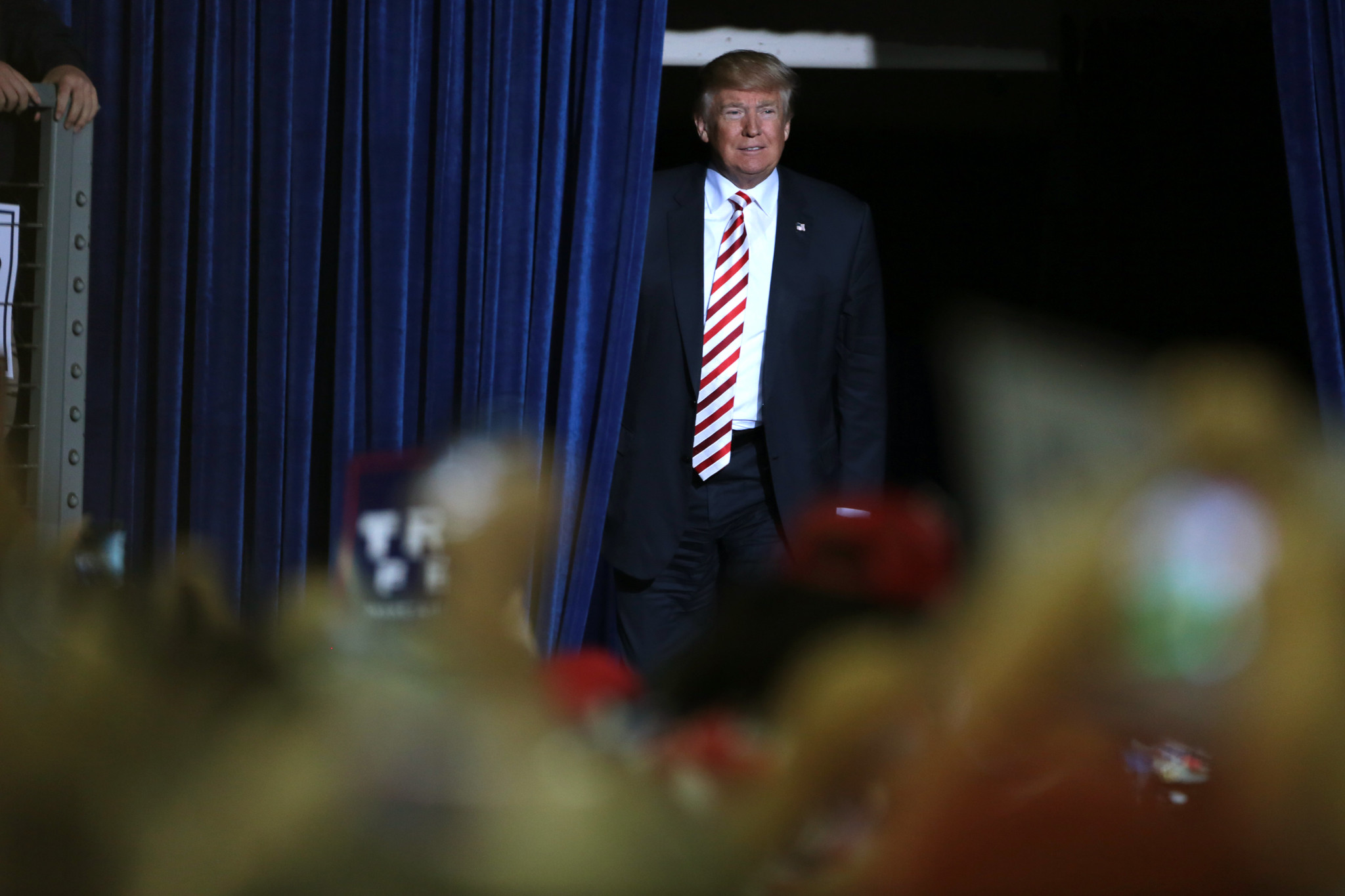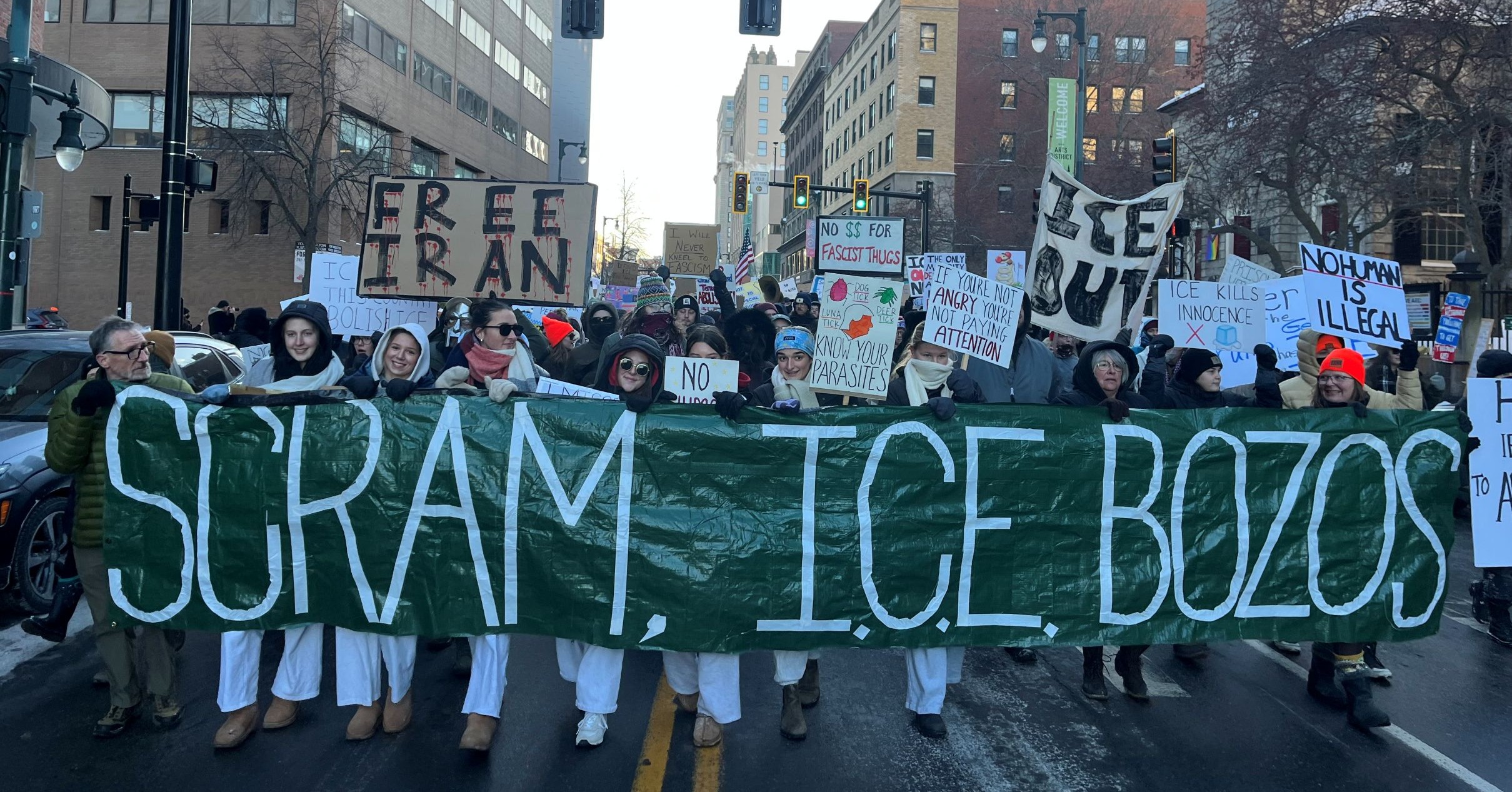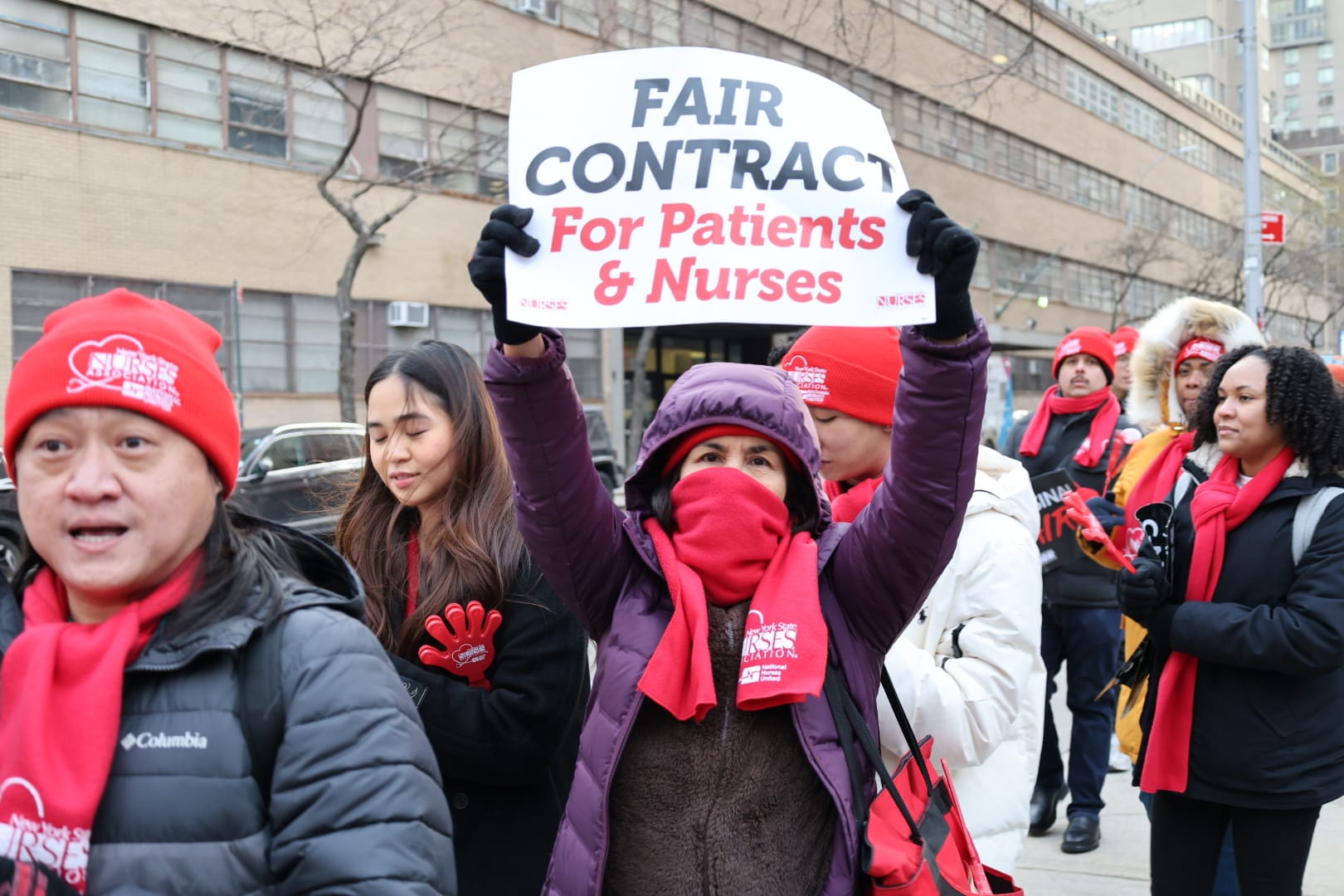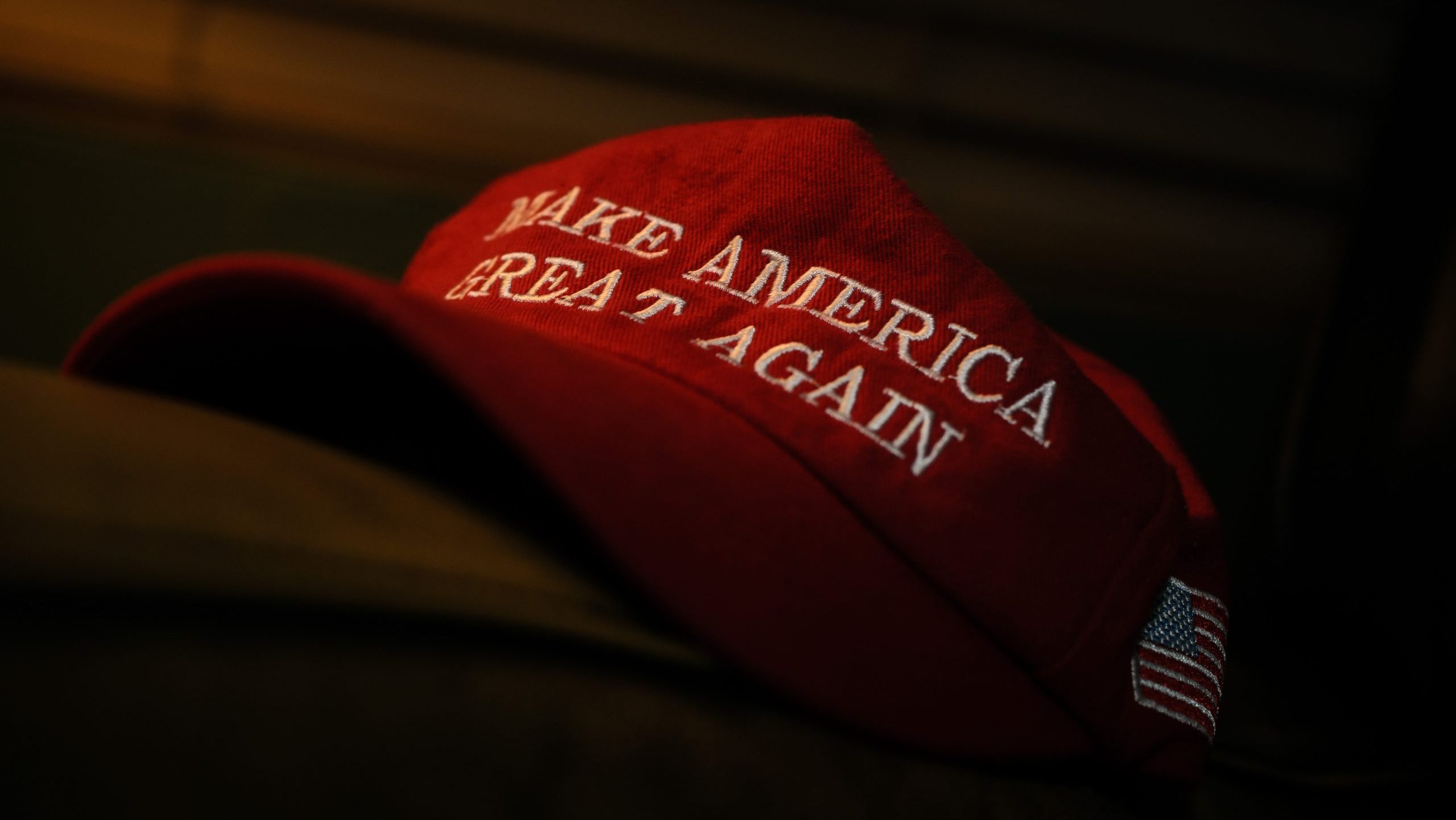This is one of two articles that we’re publishing on the 2020 presidential election. The other is here. They reflect different perspectives in DSA’s Bread & Roses caucus, inspired by a debate about DSA’s “Bernie or Bust” position. Although no vote was taken, a majority of those who contributed to the debate spoke in favor of the “Bernie or Bust” position.
This presidential election poses a serious challenge for socialists in the United States. In general, our strategy of maintaining political independence from the Democratic Party would prevent us from supporting a billionaire-backed candidate like Joe Biden. On almost every score, Biden’s record is atrocious. That is why, at the 2019 DSA National Convention, DSA and the caucus we are part of — Bread & Roses — took a position that it would only endorse Bernie’s campaign.
It is too late for DSA to reverse that position. But especially given the dangerous course Donald Trump’s campaign has taken in the last two months, our opinion on how socialists should approach the election has changed. A Biden-Trump election is qualitatively different than, for example, the 2012 election where Barack Obama and Mitt Romney faced off against each other, and it requires different tactics.
Like all tactics, electoral decisions should be based on a concrete analysis of the political conjuncture, from the strategic vantage point of advancing workers’ interests, independent class organization, and the fight for socialism. And contrary to what some on the Left seem to assume, there is no timeless principle dictating that socialists can never lend critical support to a capitalist candidate. Even Lenin at times advocated that his comrades vote for liberals to prevent a far-right electoral victory, arguing in 1907 that “when a socialist really believes in a Black-Hundred danger and is sincerely combating it — he votes for the liberals without any bargaining.” Similarly, the Bolsheviks’ 1912 electoral strategy gave the green light to common lists and electoral agreements with liberals to prevent the election of right-wingers to the state Duma.
While DSA will abstain from calling for an anti-Trump vote, we think that this position has turned out to be mistaken. As we’ll argue, it is untenable to hold the view that we as socialists want Trump to lose but we won’t say or do anything publicly to bring about a Joe Biden victory.
A Serious Threat
No one should underestimate the threat Donald Trump poses to the multiracial working class and the socialist cause.
Trump represents a continuation and radicalization of the Republicans’ racist, anti-worker, anti-democratic agenda. A second Trump term would mean a further deepening of fossil-fuel extraction and climate change inaction, more immigrant scapegoating and terrorization, more austerity and privatization, more union-busting, more far-right judges and state-sanctioned voter suppression, and more attacks on women’s rights. A second Trump term, moreover, would mean the continuation of murderous government negligence concerning the Coronavirus, which has seriously undermined our ability to collectively organize and has already cost the lives of hundreds of thousands, disproportionately workers of color.
Perhaps most decisively, Trump poses a direct threat to democracy and political freedoms. We think there is real reason to fear that a second Trump administration imposed through electoral fraud and right-wing mobilizations could set into motion a slow slide towards some kind of illiberal democracy — one in which basic rights to organize and protest would be routinely violated on an unprecedented scale. (The regime Victor Orban is building in Hungary might be the closest parallel.)
On an almost weekly basis, Trump mobilizes his allies in right-wing militias and activist organizations, who see the Left as an existential threat to the order they seek to defend. Trump came to these groups’ defense after the Charlottesville massacre, and he supports them when they assassinate protestors in the streets. In September’s debate, he called on right-wing thugs and paramilitary groups to stand by on Election Day for his orders.
At the same time, through his far-right appointees Attorney General William Barr, acting Secretary of Homeland Security Chad Wolf, and Director of National Intelligence John Ratcliffe, Trump has built a stronghold in the US intelligence agencies. Trump has terrorized immigrants and singled out Black Lives Matter protests for future repression. And he is actively constructing a political base in police departments across the country.
And most immediately troubling, he’s repeatedly stated his intention to contest the election by throwing it to the Supreme Court to stop the counting of mail-in ballots. He’s even refused to commit to stepping aside in a peaceful transition of power.
If Trump uses the Supreme Court and street mobilizations to steal the election, no one should be in any doubt that we will have entered an incredibly dangerous situation.
Will he launch a dictatorship overnight, as some liberals have suggested? The prospect seems extremely unlikely. But an election on those terms would set a second Trump administration up for a slow slide to some kind of soft authoritarian regime. And it would empower new and even more dangerous right-wing forces. The mass protests and civil disobedience that a stolen election would trigger could be the pretext for a clampdown on civil liberties combined with a significant increase in right-wing militia intimidation and violence, all in the name of cracking down on “Antifa” and property destruction. A new dynamic could take hold, in which the Trump administration would reach for more and more police powers and means of repression to strangle resistance. Trump’s base and the administration itself would likely undergo a new wave of radicalization, prompting an even more severe attack on immigrant communities in particular but also against Black Lives Matter and the Left generally.
Gaming out what such a second Trump administration would look like in detail — and predicting its long-term, precedent-setting impact on undermining democratic norms— is impossible. All we can grasp is the basic dynamic, and in our opinion that dynamic is extremely troubling.
The U.S. working class cannot afford four more years of a Trump administration. He represents an unprecedented threat. Yes, his reactionary, racist policies are a reflection of the general trajectory of right-wing radicalization that the Republican Party has been on for decades — from Ronald Reagan through Newt Gingrich and George W. Bush and up to Trump. The question for socialists is where on that trajectory of radicalization do we say “Enough!” and join with others in joint action in the streets and at the ballot box against them? We are convinced that we have reached such a point.
What Critical Support Looks Like
Socialists cannot stop this nightmare on our own. But we can and should be part of the broader movement that does. That starts with being in solidarity with and working alongside the anti-Trump movement that is beginning to mobilize in the leadup to the election and making our small contribution to the next (and hopefully last) battle in the fight to stop the worst from happening: Election Day.
Yes, unfortunately that means voting for Joe Biden and doing our best to convince our friends, family, coworkers, comrades, and neighbors to do so as well — and to do so regardless of where you live. Running up the popular vote score on Election Day will be an important part of making it more difficult for Trump to throw the election to the Supreme Court. And for those who live in battleground states, voting for and campaigning against Trump is doubly important.
As the United Electrical (UE) workers put it in their excellent statement on the election: “A massive margin of defeat for Trump will not only make it more likely that he and his supporters will accept the results, it will serve as a warning to any future president of either party against attacking workers and democracy in the way that Trump has.”
The Chicago Teachers Union (CTU) puts it similarly: “It’s a life and death issue, and don’t underestimate the importance of the Chicago Teachers Union endorsement… We belong there with the rest of our allies in defense of our democratic rights.”
We should of course vote with no illusions. Biden is not “the most progressive candidate in the history of the Democratic Party” as some on the Left are fond of saying. He’s a hardened neoliberal who may make concessions on some issues but only to the extent that labor and social movements force him to when he comes to office.
Those who try to paint a rosy picture of a Biden administration are creating confusion and will make our work building resistance to him after Election Day harder. Moreover, they are violating a basic principle of socialist politics, perfectly summed up by the revolutionary Amilcar Cabral that we should: “Tell no lies, claim no easy victories.”
Again, as the UE puts it, “Our only long-term solution is to build working-class power, both in the workplace and in the political arena, independent of the Democratic Party. Nonetheless, on November 3 a president will be elected. The working class cannot afford four more years of Trump, while a Biden presidency offers us the possibility to fight to win the political change working people need, the only way true political change has ever happened, from the bottom up.”
What does critical support look like?
First, it means telling the truth. Biden is not a friend of the working class, and socialists are right to oppose lesser-evil voting in most circumstances. But Trump really is as exceptionally dangerous as people like Bernie Sanders have been warning us. Any conversation we might have with friends, family, and coworkers about voting should start from that premise. Our job as socialists, Antonio Gramsci once wrote, is to be “permanent persuaders.” That means that we need to be able to speak honestly about both what our preferred outcome looks like (a Biden presidency, despite how repugnant it surely will be — and the need for organizing drives and new fights to build the Left) and how dangerous the alternative is (a second Trump administration overseeing a shift towards soft authoritarianism).
Second, it means helping get out the vote for Biden. After a long and brutal primary campaign in which the Left’s hopes for a Bernie Sanders victory were beaten back by a unified Democratic Party leadership, it is absolutely understandable that comrades would be disgusted with the idea of supporting Biden in any way. But we do not make history in conditions of our own choosing. At this point, the campaign against Trump needs a massive vote for Biden. We need to contribute, in any way we can, to running up that score. That means convincing those around us and joining efforts like United Against Trump to get out the vote and to demand that all votes be counted.
Finally, it means preparing for what comes next. In our DSA chapters, we need to be preparing for the struggles to come after Election Day, regardless of who wins. If Trump contests the election, only massive mobilizations at that point will be able to stop the Supreme Court from handing him victory. If Biden wins, only renewed organizing, mobilizing, and a constant campaign to clarify the debate between Democrats and socialists will keep up the momentum we’ve begun to build as the Left in the last four years.
Can Socialists Critically Support Biden?
Given the threat Trump poses, we have to choose our tactics appropriately.
Some who oppose critically supporting Biden are fond of saying that elections are a solitary act, and that from a socialist point of view who you vote for is a private matter for you to decide in the voting booth. And sometimes it’s true that elections are such an act. In most U.S. elections until recently, voters chose between center-right Democrats and right-wing Republicans. The differences between the candidates were relatively minor. But when a candidate poses such a dramatic threat to the interests and democratic rights of working people, as Trump does, we are obligated to vote with our class against the greater danger.
Other comrades worry that pushing for a Biden vote will misguide activists or discredit us among those looking for a radical alternative to the status-quo, particularly if and when Biden takes power and proceeds to implement anti-working-class policies. But this danger can be avoided so long as we never hide our sharp socialist critique of Biden’s politics and so long as we actively organize and mobilize for our demands from November 4 onwards. Adhering to this independent approach, rejecting a strategy of consistently supporting corporate Democrats and maintaining the goal of building an independent workers’ party can help us avoid the real risk of becoming yet another progressive group virtually indistinguishable from, and ultimately subordinate to, the Democratic Party. In other words, the political costs of critical support are low so long as we actually remain critical of and antagonistic towards the liberal establishment.
Ultimately, the only realistic solution to overcoming the ongoing “lesser evil” dilemma is to strengthen organized socialism and militant labor so that we can pose a viable mass political alternative to both the Democrats and Republicans. Most likely, this will also require democratizing the U.S. political regime. Jonah Furman put it well: “People think lesser-evilism is a moral taint to purge oneself of when it’s actually a tactical trap we have to organize our way out of.”
Others argue that DSA members should not campaign for Biden because our organization voted at our 2019 convention to only endorse Bernie. We agree that short of a national deliberation and vote, DSA cannot reverse its democratically decided-upon stance. But the pandemic disaster and the extent of Trump’s plans to steal the election are events that have taken place since the 2019 convention that merit serious tactical consideration. There is not time for DSA as a whole to discuss potentially revisiting its earlier decision. But that organizational non-endorsement should not preclude individual socialists from participating in anti-Trump electoral efforts so long as this is not done in the name of DSA or with our organization’s resources.
Finally, socialists in the United States must acknowledge our international responsibilities. As internationalists, we have a duty to contribute to the defeat of a president who has emboldened the far Right all over the world. From Orban in Hungary to Jair Bolsonaro in Brazil, Rodrigo Duterte in the Philippines to Matteo Salvini in Italy, right-wing politicians and their parties have felt the wind at their back in the last four years. A devastating defeat for Donald Trump in November will be a significant contribution to changing that international dynamic.
Building Working-Class Unity
If history is any indication, 2020 will be no different from past elections in one sense. Working-class people will be divided threeways between those supporting Biden, those supporting Trump, and those who choose to abstain.
We should not be surprised by this fact. The working class in the United States is so divided because of the historic failure of the Democratic Party to put forward a progressive and pro-worker agenda.
But we also shouldn’t overlook our strategic objective as socialists: helping bring about a self-organizing working class. The first step in that process is putting forward a political strategy that makes sense to the most progressive sections of the working class and building unity with those groups.
In 2020, the most progressive sections of the working class are easy to identify. They are the millions of workers who joined the Black Lives Matter protests in June and the educators, nurses, and others who have struck over the last few years. They are the millions who voted for Bernie Sanders earlier this year. They are the hundreds of thousands of activists — many working-class students — fighting for climate justice, against police brutality, and against deportations.
These sections of the working class are overwhelmingly convinced of the need to kick Trump out of office. A poll in June for example suggested 87% of Bernie voters were prepared to vote for Biden, and that number has likely only grown as Trump’s authoritarian impulses have become more and more obvious. When we talk with them, we need to be able to defend a logically consistent position. And in this election, that position is critically supporting Biden.
Wagers and Hedges in 2020
There are no guarantees in politics, and no one can predict the future. All political action has to be based on wagers and hedges. We make wagers on what we think is most likely, and we make hedges against that bet in case outcomes occur that we think are less likely.
Opponents of critical support for Biden make arguments that are premised on three wagers that we think are very dubious, and they fail to make fairly easy hedges against worst-case scenarios.
First, opponents of critical support wager that a second Trump administration simply won’t be that bad. In Red Flag, one writer puts it this way: “Arrayed against Trump are substantial sections of the state machinery, most important of which are the military generals, and large sections of the capitalist class. There is simply no need or appetite for a dictatorship among the U.S. ruling elite.”
Arguments like this, in our opinion, put far too much faith in the democratic commitments of the American ruling class. Moreover, they underestimate the capacity of Trump and his administration to act with some degree of autonomy and force solutions on capitalists. In a period of extreme tension and mass mobilization following a stolen election, there is good reason to fear that the bulk of the ruling class, the courts, and the American military could side with Trump in his push to restore stability by force. Of course that does not guarantee them victory. The power of mass movements have stopped authoritarians in their tracks before. But it weights the outcome in favor of the Right.
Second, opponents of critical support wager that the outcome of the election is essentially guaranteed. Biden, they argue, is doing so well in the polls that socialists can rest easy and not sully ourselves by getting involved. And indeed polls indicate that if the election were held today, Biden would be the easy favorite. But the stakes of the election are incredibly high, and Trump only needs to make the vote count close enough to plausibly push the question to the courts. This year is very much a situation where the “better safe than sorry” rule applies. We should take action to ensure the outcome that we all desire.
Finally, opponents of critical support will invoke the weakest wager of all: that the socialist movement is too small to matter and that our actions and positions in 2020 are of no consequence. Sure, we may desire a Biden presidency and even vote for him in the privacy of the voting booth, but our principles demand we stay out, or our time is better spent elsewhere.
It is undeniably true that the socialist movement is relatively small, and especially at this late date our contributions as individuals to defeating Trump will matter only at the margins (though the 2016 election reminds us that states can swing on very small numbers). But this does not absolve us from seriously grappling with the political issues at stake. And the approach of abstaining from the choice between Biden and Trump is just not a convincing position.
Imagine if, for example, DSA were the kind of organization we all aspire to build in the near future: an organization of hundreds of thousands of activists with roots in working-class communities and able to persuade a couple million voters. Imagine we had elected spokespeople who were able to speak on the organization’s behalf at union conventions, on TV shows, and to mass rallies. And imagine that those spokespeople were obligated to defend DSA’s current position.
The result would be ugly. Pressed by interviewers or progressive working-class activists the spokespeople would have to insist that yes, Trump is extremely bad and very dangerous, and yes all socialists want to see him lose… But no, socialists do not have a position on the choice between Trump and Biden… And no we won’t be organizing our base to vote one way or the other.
The position would be untenable. And in the event that Trump won, we would be held responsible for decades for the outcome.
There is a reason why almost every union (including the most left-wing like the UE and the CTU), class-struggle candidates like Bernie Sanders, Carlos Ramirez-Rosa, Jabari Brisport, and most prominent immigrant and social movement organizations have decided to critically support Biden, even if they did so reluctantly. If you have a real base, it is simply impossible to explain the position that you want Trump out of office but you don’t support a Biden victory and won’t do anything to bring it about.
DSA does not face that dilemma yet because it does not have a real base, but it will if we continue to organize strategically. And we are convinced that when we do face such a challenge, and if we face similar conditions to this election again, we’ll make the same choice that the UE, the CTU, Bernie, Carlos, Jabari, and other organizations have made.
On each wager we have come, begrudgingly, to a different conclusion than the opponents of critical support. And we see no reason why, even if they are correct in any of their wagers, we should not hedge against the worst possible outcome anyway. As we have argued, no principle precludes us from critically supporting Biden, doing so lines us up with the vast majority of the working class we want to bring into our movement in the near future, and the interests of our class are very much at stake.
For these reasons, our basic approach, assuming Biden wins on election night, has to be: against Trump on November 3, against Biden on November 4.




